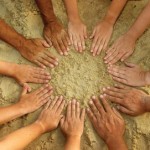 THE RE-BUILDING OF LOCAL RESILIENCE
THE RE-BUILDING OF LOCAL RESILIENCE
In the last issue I introduced the notion of a Good Life 2.0, an aspiration for self reliance for the 21st century based on community systems. Ten years ago I met the late John Seymour, whose books on self-sufficiency inspired the classic TV sitcom ‘The Good Life’. On his small-holding in Wexford John told me that he had come to the conclusion that it would be too difficult to sustain the noble effort of living off-grid and providing for all your own needs on your own land. Going solo wasn’t enough. His new thinking was co-sufficiency, self-reliant local communities that could work together to meet their needs and make the transition to a post-industrial economy not dependent on fossil fuel.
These days a question we often hear is, “how long is this downturn going to last?” There’s a commonly held belief that it is only a matter of time before we get back to a ‘business as usual’ scenario. But what many fail to grasp is the ‘once in a species’ opportunity that these challenges offer us.
As well as ‘fixing the economy’, we need to radically decrease our dependence on oil, coal and gas. This means looking beyond the obvious, i.e. electricity supply or fuel, and looking at our food, health and economic systems. Today almost everything we do is dependent upon a non-renewable, climate-changing source of energy. Now, with the peaking of the global oil supply we are entering an era of new uncertainties. One thing that will help us in these challenging times is the building of local resilience.
Resilience is the ability of a system to hold together and function in the face of disruption and shock. This means having the capacity to deal with adversity and the ability to develop new ways of doing things when current approaches no longer serve us. Because the possibility of breakdown in our social, economic and environmental systems is rising, we need to find ways to rebuild the resilience of our local communities.
We in Ireland are more reliant on imported oil for our energy requirements than almost every other European country. What we need is a ‘powerdown’ strategy to help us cope with these problems, while increasing our ‘well being’ in the process. Although the majority of the debate about energy futures and the transition to a low-carbon economy has focused on supply-side replacements for fossil fuels, a lot of work has begun on looking at reducing our energy demand and exploring the prospects for building local resilience.
The Cultivate Centre has developed a course to nurture community sustainability called Community Powerdown – Training for Leadership, Livelihoods and Local Resilience. The course provides the learners with the context of the global changes we face and offers pathways, new thinking and a set of tools that will enable them and their communities to make an informed response.
The course can be taken as a weekend intensive workshop or as classes over a ten-week period. In addition to this, Cultivate are training trainers to deliver the course in their own communities and are now developing a week-long immersive learning experience delivered at the Cloughjordan Eco-village in North Tipperary.
The Powerdown course supports and encourages the formation and development of Transitions Towns. These are communities that are characterised by creative, collaborative actions that nurture the building of local resilience through social, economic and environmental initiatives.
At the 14th Convergence Sustainable Living Festival, recently held at Cultivate, the ‘Powerdown Show’ was launched. Ten short films produced by Cultivate for broadcast on the new Dublin Community Television Station, DCTV. The show is based on the ten modules of the Community Powerdown Course and is now used as a learning resource in the delivery of the course.
The 10 episodes of the Powerdown Show, which are available from Cultivate on a stand alone DVD, are a fantastic resource for anyone interested in making the transition to a low carbon and re-localised future that is abundant, pleasurable, and most of all, resilient.
Davie Philip is the Education Manager at the Cultivate Centre for sustainable living and learning in Dublin www.cultivate.ie and a member of the Village project in Cloughjordan, Co. Tipperary. www.thevillage.ie He is currently the coordinator of the Transition Town Network in Ireland http://transitiontownsireland.ning.com Contact davie@cultivate.ie

![istock_000002904280medium-150×150[1]](https://www.positivelife.ie/dev/wp-content/uploads/2009/09/istock_000002904280medium-150x1501.jpg)
